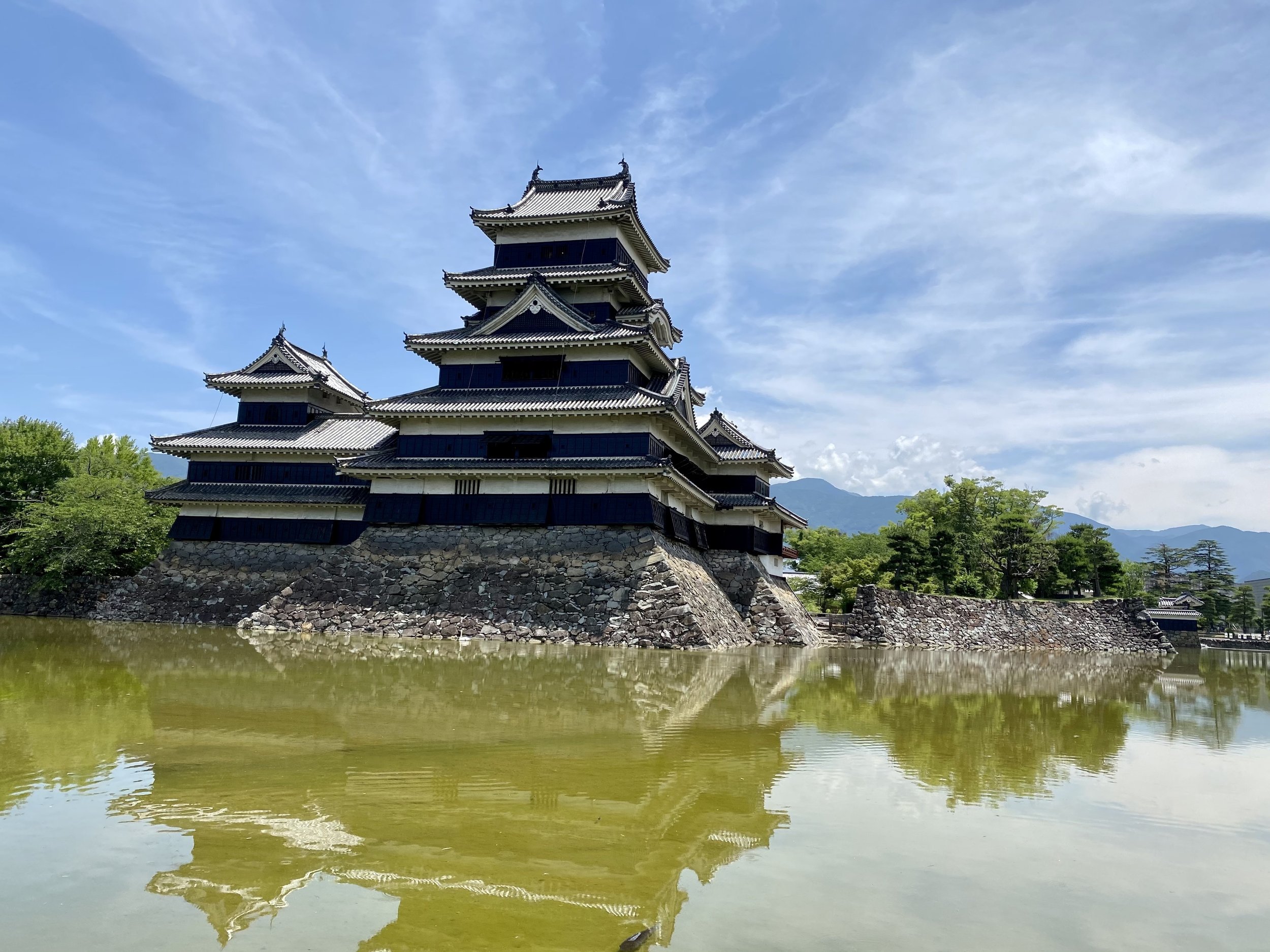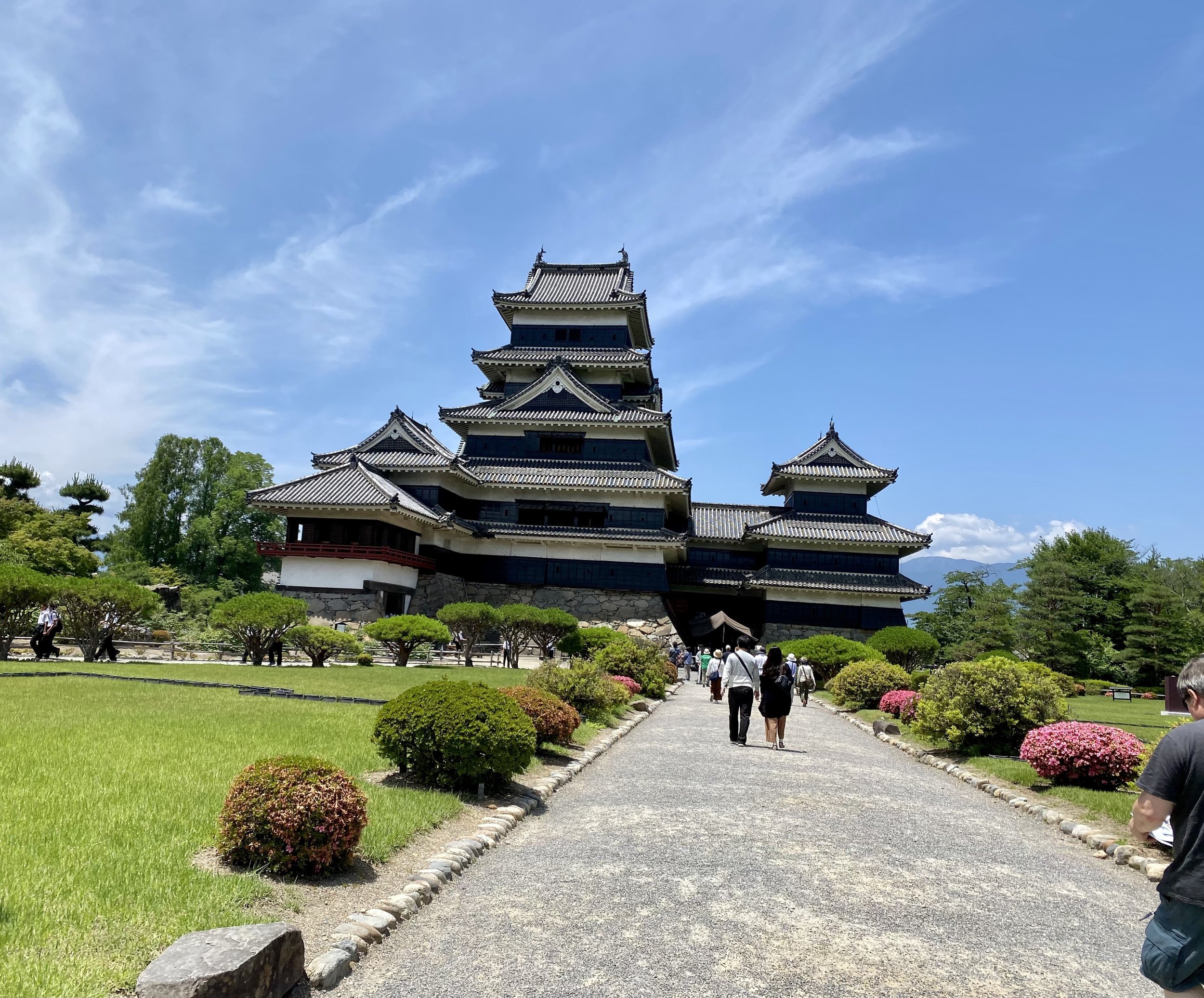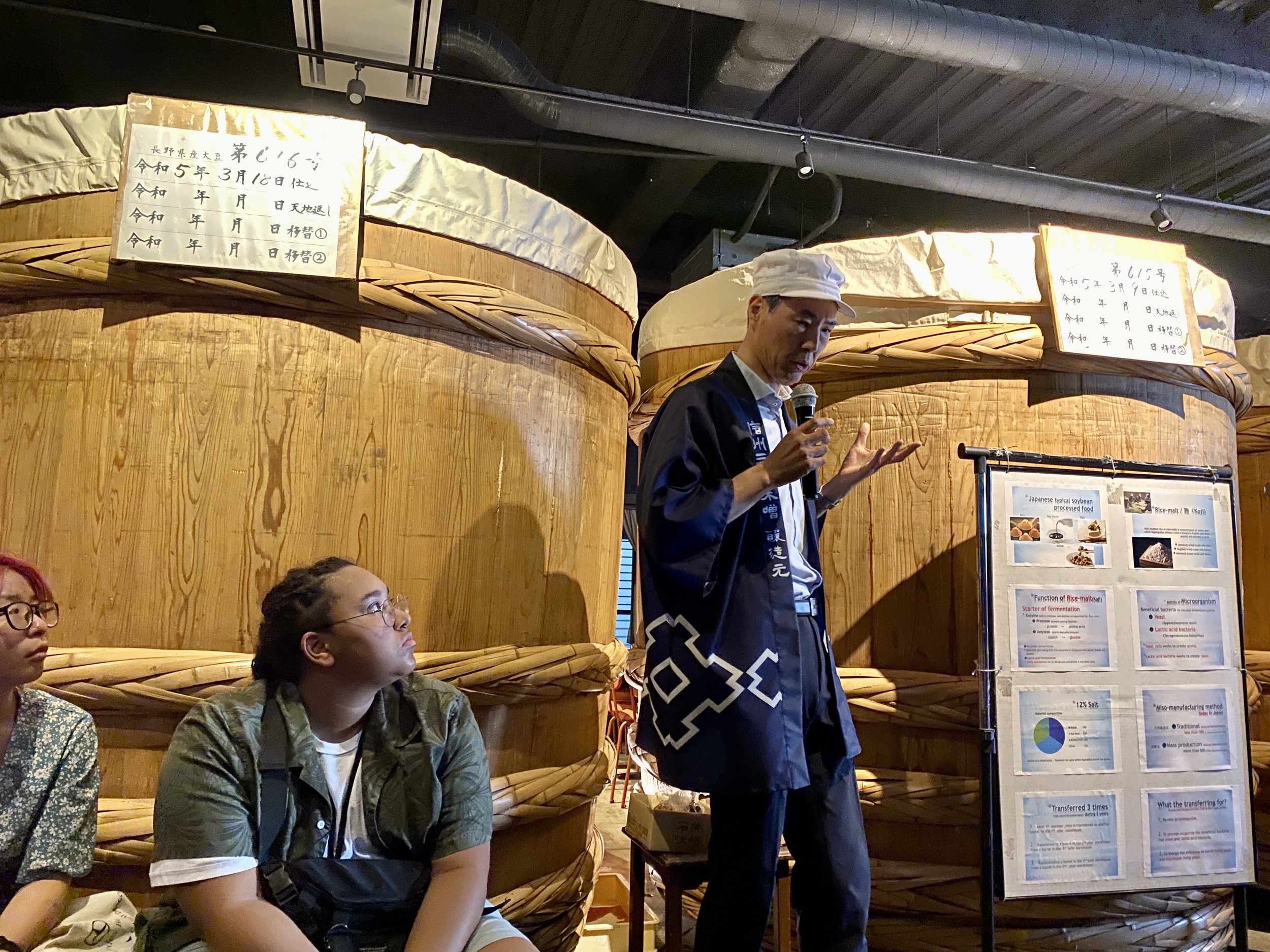June 20: Other People's Limitations
June 20: Other People’s Limitations
Hands grab at my arms
I resist like a three-year old
Cannot shake the grip
On our way back from Green Village, we stopped at Matsumoto Castle. The grounds are gorgeous and I was excited to go inside. I was warned by those who have been to the castle before that the stairs are challenging and steep and that the lighting was dim. I planned to take my time.
As I left the bus, the Technos student leader of the trip told me they wanted to go with me. After a group photo, we headed towards the castle. As is Japanese custom, we took our shoes off at the door and then put them in plastic bags to carry with us. Takeshi gathered my shoes along with theirs and we climbed some stairs into the space. Heading up to the front door, I was suddenly swarmed by faculty checking on me. While I very much appreciated that people recognize that spaces like Matsimoto’s Castle are a challenge for me, it was immediately overwhelming. I asked for a moment to adjust to the dim lighting after leaving the sunny day.
From this point forward, one of the faculty would not give me room. She is one of the kindest people I encountered and from another Asian culture that emphasizes sharing and care for others. I deeply appreciate it. She brought a myriad of special sweets to share with faculty during our retreat, always shares what she has, and has been adamant about taking care of me throughout the trip (doing things like setting up my sleeping futon and other items when we first arrived at American House - actions that I both appreciated and found frustrating as they kept me from feeling like I was pulling my weight on things that I totally was capable of doing).
The three of us headed up the first set of stairs, which were incredibly tall, but had great railings and I felt quite confident navigating. I also felt claustrophobic with two people’s arms around me trying to help me navigate the stairs. When we reached the first floor, the colleague immediately tried to guide me back downstairs. I said that I wanted to continue up. We moved along in this tightly intertwined group for another floor. Again I was asked to go back down, somewhat pulled towards the exit. I am pretty sure I yanked away, saying that I wanted to continue up and felt just fine. Then the calls of “slowly! Slowly!” And “careful” began, This did not bring out the best of me as I moved quickly (but within myself) up the stairs. Another floor of being hustled past exhibits and moved around. We came to the next set of stairs and I was physically moved past them to the stairs heading down, where I was strongly encouraged to scoot down on my ass. Nothing wrong with this method. Many people were using it. But I found heading down backwards was totally stable and it is a method I employ constantly on the somewhat precarious stairs between the main stage and the balcony in the theatre. I know what I am doing.
My immediate - and lingering - response to this experience is anger. It made me want to push people away from me in response to the assumptions that were being made about my capabilities and comfort. I was denied agency in how I navigated my world. While I recognize that I struggled mightily in the presence of my colleagues when walking back to the American House in the darkness of night - even with a good lantern - the Castle was different circumstances. If I had been asked what would be helpful, I could have told people that what I needed was advance warning when I was walking towards a beam or about to hit stairs or when we were close to random raised footing. I would have welcomed this assistance. But I wasn’t asked, which made me feel completely DISabled in the circumstances.
Please. Don’t do this shit to disabled people. Don’t make assumptions about what our capabilities are. I promise you that we know them better than you - we live in our bodies all the time and understand how they respond in varied circumstances. When I was venting about this experience to a colleague who wasn’t with me during my walk through the castle, they said they were sorry that was my experience but that they would have been very concerned for me heading up the final flight of stairs, again implying that I should not have been allowed up. I should have been allowed to make that decision for myself, the same as every single other person in the space - many of whom have their own issues that would impact their ability to navigate the circumstances but who are perceived as abled…and therefore allowed to determine their own way of navigating the world.
Please, if you do want to help, ask disabled what would be helpful. (Though be prepared to be told to bugger off without taking it personally.) Don’t assume that what is useful in one moment is automatically helpful in the next - this is a mistake I made / make far too often. Disability is fluid. Bodies are always in flux - I’m sure all of us recognize that some days we wake up achy and have to limit our activity. Some days we feel ready to conquer the world. This is what it means to be human.
That said, I am working to recognize the pleasures from what happened. Because I was not allowed as much time in the castle as I would have preferred, I spent time talking to Takeshi about their studies, learning about training to be a makeup artist in Japan, what they like to eat, favorite plants, and other odds and ends. They asked me some questions about my eyesight and then asked if it was rude. I said that it depended on the person - that some people would undoubtedly find it rude but that I would prefer that folks not make assumptions.
I also am trying to focus on the caring demonstrated to me by colleagues. I appreciate that they do not simply rush off to have their own experiences, but rather are willing to modify the way they walk through the world to allow me to engage with it as well. I wish more people were willing to do this.
Lunch led to a different kind of chafing of cultures. We had the most wonderful tour of the Ishii Miso Brewery in Masimoto, a brewery founded in 1868, still owned by the same family and producing miso in the traditional way. The space was gorgeous and we learned quite a bit about the process by which their miso is made. They ferment miso for 3 years in cedar barrels that hold 4.5 tons of miso, which gets moved into a total of 4 barrels over the course of 3 years. They have barrels that are over 100 years old (apparently they last as long as 200 years).
Following our tour, we went up to the restaurant to have lunch. As always, the Technos staff and the restaurant staff worked very hard to meet a wide range of dietary restrictions. I was seated at a table with the one vegan on campus. When it was time for lunch, restaurant staff explained what we were about to eat. They noted that their miso sauce should be put on a dish before us. Our plates had a variety of mushrooms, squash, broccoli, squash, maybe some other things. There was no miso sauce. A few of the students asked what was in the miso sauce and the answer was that it was the three things we had learned they used, none of which would be in conflict with our diet. We asked if we could get some. The Ishii staff noted that the fermentation created a slightly alcoholic product, which then made apparent why the majority of students with dietary restrictions that have to do with religious faith couldn’t have it. Myself and the vegan student, however, noted that we could drink and asked to have some miso paste. I tried so hard all trip to simply eat whatever was given to me, appreciative of the labor people put into creating dining experiences that best matched my needs - even when some of these decisions were odd. I was not, however, good about letting go of the miso paste given that we were at a miso factory and I would never have this opportunity again.
Our ongoing attempts to get sauce flustered everyone and led to repeated rounds with kitchen staff, me, and Tecnos students. At one point when I asked if I could please get some miso, the Technos student working with us broke down and said they would have to get permission from Matt as head of the program because as a student they cannot be responsible for making a decision.
This level of deference is difficult for me to understand. From my perspective, if someone decides they want to do something that they previously have said they don’t want to do (a generous reading of what was going on here), you let them do it - assuming the resources are still available. Their actions should be theirs to take. It doesn’t feel like something that should require approval from a third party…and yet we could not move forwards without it. In this way, rigid forms of deference seem to stymie individual confidence. While I admire the trust Japanese students appear to give to their faculty - and each other - it also feels like a barrier to personal growth and learning how to think things through for yourself. In the end, the other student requesting miso sauce said they didn’t want to cause any additional stress, simply asked that I get miso sauce (which I did), and we all moved on.
Reflecting back on this day now that I am home, perhaps one of the things I wish I could best share with others is the way theatre has taught me to constantly reevaluate my given circumstances and to base my decisions on what is going on in the moment. I believe that theatre has taught me to embrace fluidity, flexibility, and thinking carefully about intended outcomes as a means of shaping decision making. The ability to recognize that human action and interaction must be flexible and responsive is probably the number one reason I believe that all people would be well-served to study theatre.
Side note - Ishii Miso makes miso ice cream. It is divine. Tastes a bit like salty caramel, but with fermentation.




